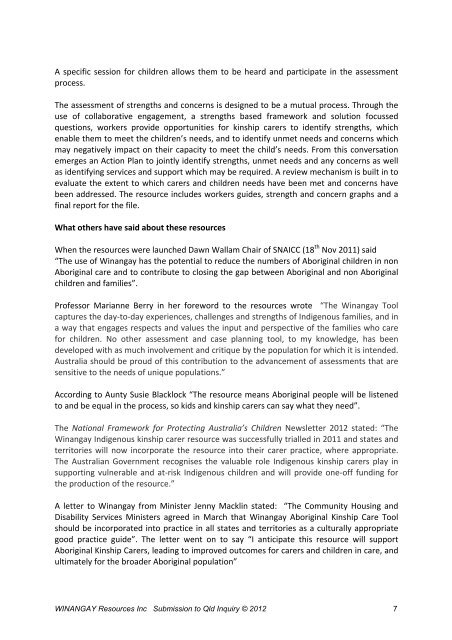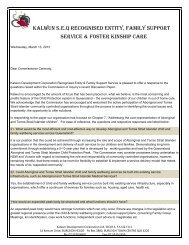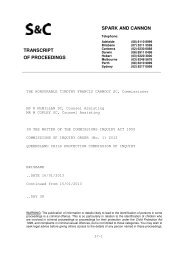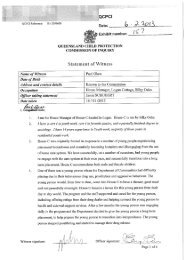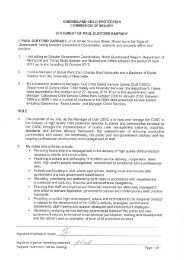Winangay Resources Inc - Queensland Child Protection ...
Winangay Resources Inc - Queensland Child Protection ...
Winangay Resources Inc - Queensland Child Protection ...
You also want an ePaper? Increase the reach of your titles
YUMPU automatically turns print PDFs into web optimized ePapers that Google loves.
A specific session for children allows them to be heard and participate in the assessment<br />
process.<br />
The assessment of strengths and concerns is designed to be a mutual process. Through the<br />
use of collaborative engagement, a strengths based framework and solution focussed<br />
questions, workers provide opportunities for kinship carers to identify strengths, which<br />
enable them to meet the children’s needs, and to identify unmet needs and concerns which<br />
may negatively impact on their capacity to meet the child’s needs. From this conversation<br />
emerges an Action Plan to jointly identify strengths, unmet needs and any concerns as well<br />
as identifying services and support which may be required. A review mechanism is built in to<br />
evaluate the extent to which carers and children needs have been met and concerns have<br />
been addressed. The resource includes workers guides, strength and concern graphs and a<br />
final report for the file.<br />
What others have said about these resources<br />
When the resources were launched Dawn Wallam Chair of SNAICC (18 th Nov 2011) said<br />
“The use of <strong>Winangay</strong> has the potential to reduce the numbers of Aboriginal children in non<br />
Aboriginal care and to contribute to closing the gap between Aboriginal and non Aboriginal<br />
children and families”.<br />
Professor Marianne Berry in her foreword to the resources wrote “The <strong>Winangay</strong> Tool<br />
captures the day‐to‐day experiences, challenges and strengths of Indigenous families, and in<br />
a way that engages respects and values the input and perspective of the families who care<br />
for children. No other assessment and case planning tool, to my knowledge, has been<br />
developed with as much involvement and critique by the population for which it is intended.<br />
Australia should be proud of this contribution to the advancement of assessments that are<br />
sensitive to the needs of unique populations.”<br />
According to Aunty Susie Blacklock “The resource means Aboriginal people will be listened<br />
to and be equal in the process, so kids and kinship carers can say what they need”.<br />
The National Framework for Protecting Australia’s <strong>Child</strong>ren Newsletter 2012 stated: “The<br />
<strong>Winangay</strong> Indigenous kinship carer resource was successfully trialled in 2011 and states and<br />
territories will now incorporate the resource into their carer practice, where appropriate.<br />
The Australian Government recognises the valuable role Indigenous kinship carers play in<br />
supporting vulnerable and at‐risk Indigenous children and will provide one‐off funding for<br />
the production of the resource.”<br />
A letter to <strong>Winangay</strong> from Minister Jenny Macklin stated: “The Community Housing and<br />
Disability Services Ministers agreed in March that <strong>Winangay</strong> Aboriginal Kinship Care Tool<br />
should be incorporated into practice in all states and territories as a culturally appropriate<br />
good practice guide”. The letter went on to say “I anticipate this resource will support<br />
Aboriginal Kinship Carers, leading to improved outcomes for carers and children in care, and<br />
ultimately for the broader Aboriginal population”<br />
WINANGAY <strong>Resources</strong> <strong>Inc</strong> Submission to Qld Inquiry © 2012 7


